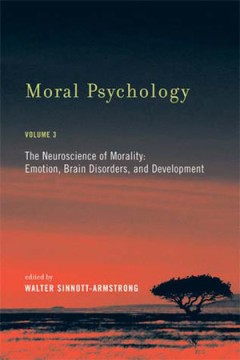Filter by

Human Dignity, Human Rights, and Responsibility :the New Language of Global B…
Title from PDF title page (viewed on Oct. 11, 2012)."'Human dignity' has been enshrined in international agreements and national constitutions as a fundamental human right. The World Medical Association calls on physicians to respect human dignity and to discharge their duties with dignity. And yet human dignity is a term--like love, hope, and justice--that is intuitively grasped but never clea…
- Edition
- -
- ISBN/ISSN
- 9780262305815
- Collation
- 1 online resource (xiv, 349 pages) :illustrations.
- Series Title
- -
- Call Number
- -

Natural ethical facts :evolution, connectionism, and moral cognition
"A Bradford book."In Natural Ethical Facts William Casebeer argues that we can articulate a fully naturalized ethical theory using concepts from evolutionary biology and cognitive science, and that we can study moral cognition just as we study other forms of cognition. His goal is to show that we have "softly fixed" human natures, that these natures are evolved, and that our lives go well or ba…
- Edition
- -
- ISBN/ISSN
- 9780262270021
- Collation
- 1 online resource (x, 214 pages)
- Series Title
- -
- Call Number
- -

Moral psychology, The Neuroscience of Morality: Emotion, Brain Disorders, and…
"For much of the twentieth century, philosophy and science went their separate ways. In moral philosophy, fear of the so-called naturalistic fallacy kept moral philosophers from incorporating developments in biology and psychology. Since the 1990s, however, many philosophers have drawn on recent advances in cognitive psychology, brain science, and evolutionary psychology to inform their work. T…
- Edition
- -
- ISBN/ISSN
- -
- Collation
- -
- Series Title
- -
- Call Number
- -

Bioethics in the age of new media / Computation, Aesthetics, and Space
Joanna Zylinska examines the ethical challenges presented by technology to the allegedly sacrosant idea of the human & makes a proposal for a new ethics of life rooted in the philosophy of
- Edition
- -
- ISBN/ISSN
- -
- Collation
- 1 online resource (xv, 230 pages)
- Series Title
- -
- Call Number
- -

A Theory of General Ethics: Human Relationships, Nature, and the Built Enviro…
An integrated approach to ethics that covers interhuman ethics, the ethics of the natural environment (including animals), and the ethics of the built environment, and enables us to offer sensible and defensible answers to the widest possible range of eth.OCLC-licensed vendor bibliographic record.
- Edition
- -
- ISBN/ISSN
- 9780262273053
- Collation
- 1 online resource (x, 392 pages)
- Series Title
- -
- Call Number
- -

Against nature
A pithy work of philosophical anthropology that explores why humans find moral orders in natural orders. Why have human beings, in many different cultures and epochs, looked to nature as a source of norms for human behavior From ancient India and ancient Greece, medieval France and Enlightenment America, up to the latest controversies over gay marriage and cloning, natural orders have been enli…
- Edition
- -
- ISBN/ISSN
- 9780262353809
- Collation
- 1 online resource (96 pages) :illustrations.
- Series Title
- -
- Call Number
- -

Against moral responsibility
Here, Bruce Waller launches a spirited attack on a system that is profoundly entrenched in our society and its institutions deeply rooted in our emotions, and vigorously defended by philosophers from ancient times to the present.OCLC-licensed vendor bibliographic record.
- Edition
- -
- ISBN/ISSN
- 9780262298940
- Collation
- 1 online resource
- Series Title
- -
- Call Number
- -

Like-minded :externalism and moral psychology
This title presents a proposal that the cognitive processes that make us moral agents are partially constituted by features of our external environments.OCLC-licensed vendor bibliographic record.
- Edition
- -
- ISBN/ISSN
- 9780262298926
- Collation
- 1 online resource (xi, 282 pages) :illustrations
- Series Title
- -
- Call Number
- -

Communicative Action and Rational Choice
Originally published: 2001.In this book Joseph Heath brings Jurgen Habermas's theory of communicative action into dialogue with the most sophisticated articulation of the instrumental conception of practical rationality-modern rational choice theory. Heath begins with an overview of Habermas's action theory and his critique of decision and game theory. He then offers an alternative to Habermas'…
- Edition
- -
- ISBN/ISSN
- 9780262275156
- Collation
- 1 online resource (xii, 363 pages) :illustrations.
- Series Title
- -
- Call Number
- -

Confessions of a Medicine Man: An Essay in Popular Philosophy
A physician/philosopher uses anecdotes, historical narrative, and philosophical concepts to draw a moral portrait of the doctor-patient relationship."My mission is to analyze medicines ethical structure. I do so as both a physician and a philosopher. Of my two voices, it is the latter that is informed by the former ... As a physician I have sought professional solutions to the frustrations of f…
- Edition
- -
- ISBN/ISSN
- 9780262284691
- Collation
- 1 online resource
- Series Title
- -
- Call Number
- -
 Computer Science, Information & General Works
Computer Science, Information & General Works  Philosophy & Psychology
Philosophy & Psychology  Religion
Religion  Social Sciences
Social Sciences  Language
Language  Pure Science
Pure Science  Applied Sciences
Applied Sciences  Art & Recreation
Art & Recreation  Literature
Literature  History & Geography
History & Geography